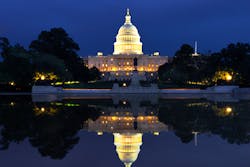U.S. Senate Coronavirus Bill Includes $117 Billion for Hospitals, Healthcare
Very late on Wednesday night, the news broke that the U.S. Senate had approved unanimously by voice vote a final draft version of the $2 trillion federal stimulus bill that has been working its way through the U.S. Congress this week. As of midnight eastern time on Wednesday night, the situation remained somewhat fluid, but CNN staff reporters reported the following:
“The stimulus package would provide about $117 billion for hospitals, according to an estimate from the American Hospital Association, which called it an important first step.
The bill creates a $100 billion public health and social emergency fund to reimburse providers for expenses and lost revenues related to the coronavirus pandemic. About $65 billion will go to hospitals, with the rest funneled to doctors, nurses, suppliers and others, the association said.
The legislation also boosts reimbursements by 20 percent for treating Medicare patients with coronavirus. And it eliminates $8 billion in scheduled payment reductions to hospitals caring for large numbers of uninsured and Medicaid patients, as well as temporarily removing a 2 percent cut for treating Medicare patients, which was part of the automatic budget cuts under sequestration.
The American Hospital Association, along with the American Medical Association and American Nurses Association, had asked Congress to provide $100 billion for healthcare personnel and providers to address the outbreak.”
And POLITICO’s Caitlin Emma and Jennifer Scholtes wrote this, in their article, entitled “Here’s what’s in the $2T stimulus package—and what’s next”:
“What they got: Health care providers would secure $100 billion in grants to help fight the coronavirus and make up for dollars they have lost by delaying elective surgeries and other procedures to focus on the outbreak. They would also get a 20 percent bump in Medicare payments for treating patients with the virus. Why it matters: This figure is exactly what three powerful groups representing physicians, hospitals and nurses had demanded, though for-profit hospitals were lobbying for much more. But there are still questions about whether there will be significant guardrails on how the money will be split up. The coronavirus will hit rural hospitals especially hard, since they already operate on thin margins and have limited staffing capacity. So some lawmakers have been working to ensure enough money goes to those sites,” Emma and Scholtes wrote.
And the Washington Post’s Jeff Stein wrote late Wednesday night that “Hospitals, expanded health-care spending. The legislation also includes hundreds of billions of dollars in funding to help prepare America’s health-care infrastructure for the coronavirus. The centerpiece of that section of the bill, a key ask of Senate Democrats, is a $100 billion fund for hospitals and providers hit hardest by the outbreak. That money can be used for protective gear for health-care workers, testing supplies and emergency operation centers, among other necessities. The provision was written amid bleak outlooks at many hospitals, particularly in rural America, that fear they will be overrun by a massive influx of patients. The legislation also increases funding for community health centers; Medicare payments; telehealth and home service; and public health agencies such as the Center for Disease Control and Prevention,” Stein wrote.
What’s more, in the Senate bill, three sections were specifically devoted to telehealth provisions—Sections 3701-3705, under Subtitle D of the Senate version of the bill. All speak to expanding telehealth payment across healthcare, including in federally qualified health centers, rehab care organizations, and long-term care organizations.
The AMGA, a trade association representing multispecialty medical groups and integrated systems of care, released a statement saying they appreciate Congress’ efforts and will continue to work with key House and Senate throughout this crisis. “The first priority is patient care and safety, and that’s why this funding for PPE is so important,” said AMGA President and CEO Jerry Penso, M.D. “But the Senate also is acknowledging the incredible financial strain COVID-19 is creating for providers, who quickly recognized the need to change their practice patterns so they can fight the virus.”
The Senate bill is expected to go to the House of Representatives on Friday, and to be signed by President Donald Trump after passage by the House.
Healthcare Innovation will provide updates on this developing story.


